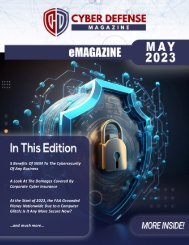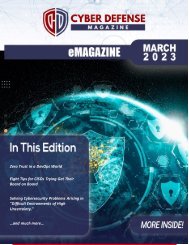Cyber Defense eMagazine February Edition for 2023
Cyber Defense eMagazine February Edition for 2023 #CDM #CYBERDEFENSEMAG @CyberDefenseMag by @Miliefsky a world-renowned cyber security expert and the Publisher of Cyber Defense Magazine as part of the Cyber Defense Media Group as well as Yan Ross, Editor-in-Chief and many more writers, partners and supporters who make this an awesome publication! Thank you all and to our readers! OSINT ROCKS! #CDM #CDMG #OSINT #CYBERSECURITY #INFOSEC #BEST #PRACTICES #TIPS #TECHNIQUES
Cyber Defense eMagazine February Edition for 2023 #CDM #CYBERDEFENSEMAG @CyberDefenseMag by @Miliefsky a world-renowned cyber security expert and the Publisher of Cyber Defense Magazine as part of the Cyber Defense Media Group as well as Yan Ross, Editor-in-Chief and many more writers, partners and supporters who make this an awesome publication! Thank you all and to our readers! OSINT ROCKS! #CDM #CDMG #OSINT #CYBERSECURITY #INFOSEC #BEST #PRACTICES #TIPS #TECHNIQUES
Create successful ePaper yourself
Turn your PDF publications into a flip-book with our unique Google optimized e-Paper software.
The three biggest points of pain<br />
Quite simply, consumer-grade messaging apps are not fit <strong>for</strong> use in the workplace because the employer<br />
cannot apply any of its controls and compliance needs on them.<br />
Employee use of consumer messaging apps causes organizations three separate headaches around<br />
transparency, inclusivity and data sovereignty.<br />
1. Lack of transparency is of most immediate concern as that has drawn the attention of regulators.<br />
For instance the Securities and Exchange Commission (SEC) and Commodity Futures Trading<br />
Commission (CFTC) have fined 16 US investment banks $2B as a result of employees’ use of<br />
personal messaging apps, because the employer no longer has reliable oversight and record<br />
keeping of business related discussion and decision-making. Concerns have been raised in other<br />
countries like the UK, where the In<strong>for</strong>mation Commissioner's Office (ICO) warned against<br />
government officials using WhatsApp and personal email.<br />
2. Meanwhile, a lack of admin control and integration with company systems is causing inclusivity<br />
problems <strong>for</strong> executive leadership, HR teams and team leaders. With no oversight or<br />
management from the company, employees are able to download a consumer-grade messaging<br />
app. As there’s no interoperability between messaging apps, the work<strong>for</strong>ce ends up fragmented<br />
across different siloed apps. Even if employees were all in the same walled garden, with no admin<br />
control it’s inevitable that team members are left out of certain groups; be that accident or<br />
malevolent. Likewise, removing group chat access when an employee leaves is best not left to<br />
chance.<br />
3. The third significant problem is secure data management. A consumer-grade messaging app is<br />
a one size fits all proposition. Neither the company or its work<strong>for</strong>ce can specify where or how the<br />
service is hosted. In the case of WhatsApp, it means all data is stored and managed on servers<br />
owned by Meta - a company whose business model is based on mining its users’ data. It is not<br />
where or how a company should choose to host its data. Neither would a responsible company<br />
leave potentially vital discussion and data accessible only through two or three employees’<br />
devices who happened to be part of that conversation at the time. End-to-end encryption<br />
undoubtedly improves security, but it severely impacts data management if the company has no<br />
control over it.<br />
Enterprise messaging apps can trans<strong>for</strong>m the workplace.<br />
Employees quite rightly view consumer messaging apps as a way to speed communication and improve<br />
productivity. Yet from the organization’s point of view, the risk far outstrips the gain.<br />
The solution lies in a messaging app built <strong>for</strong> enterprises. It should allow the company to own and<br />
configure the plat<strong>for</strong>m, including where and how to host the service. It would also give the company<br />
complete admin control over the plat<strong>for</strong>m; the provisioning and deprovisioning of employees,<br />
management of chat room hierarchies, record keeping, antivirus and all the rest of it. Essentially, an<br />
enterprise-grade messaging plat<strong>for</strong>m provides all the enterprise control and functionality that’s taken <strong>for</strong><br />
granted with corporate email.<br />
<strong>Cyber</strong> <strong>Defense</strong> <strong>eMagazine</strong> – <strong>February</strong> <strong>2023</strong> <strong>Edition</strong> 80<br />
Copyright © <strong>2023</strong>, <strong>Cyber</strong> <strong>Defense</strong> Magazine. All rights reserved worldwide.

















